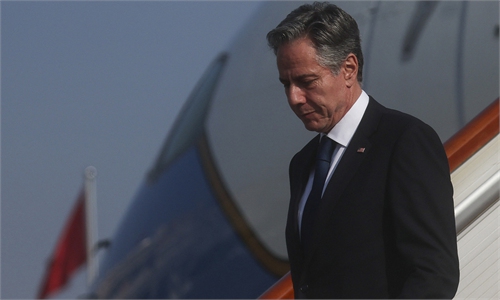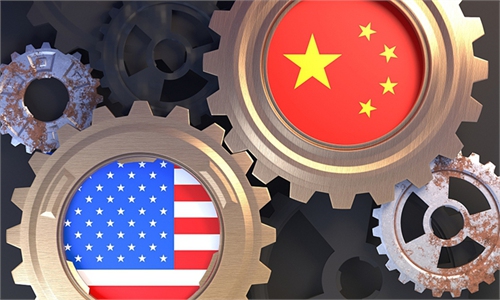
Illustration: Liu Rui/GT
China never rejects communication, but the key is how to communicate and whether it can achieve desired results, Yang Tao, director-general of the Department of North American and Oceanian Affairs of the Chinese Foreign Ministry, told the Global Times on Monday, as he briefed Chinese and foreign media about US Secretary of State Antony Blinken's visit to China from Sunday to Monday.
"Communication does not mean only seeking one's own concerns while ignoring the concerns of the other," said Yang.
A statement on Sunday by a US State Department spokesperson said that Blinken said the US will "work with its allies and partners to advance our vision for a world that is free, open, and upholds the rules-based international order."
Yang said that the original intention of President Xi Jinping in advocating a community with a shared future for mankind is to maximize international solidarity and cooperation to jointly address global challenges.
"China is the first country to sign the UN Charter. It is the creator, defender and beneficiary of the current international order. Why should China change the existing international order?" said Yang.
"Some people always talk about the 'rules-based international order.' What rules are they based on? If it is the UN Charter, China has no problem. If it is the rules formulated by a handful of countries, China, as well as many other countries, will find it difficult to agree," Yang said.
According to the State Department statement, Blinken emphasized the importance of maintaining open channels of communication across the full range of issues to reduce the risk of miscalculation. Yang said that both sides have agreed to jointly implement the important common understandings reached by the two presidents in Bali, Indonesia, effectively manage differences, and advance dialogue, exchanges and cooperation. Blinken invited Chinese State Councilor and Foreign Minister Qin Gang to visit the US, and Qin expressed his willingness to visit the US at the convenience of both sides.
Yang stressed that China never rejects communication, but the key is how and what the desired results are. Both parties should make sure the communication is effective. One party cannot only seek to solve its own concerns while ignoring the concerns of the other party. No party should say one thing but do another, Yang said.
China is willing to conduct constructive communication and dialogue in the spirit of mutual respect, and the US side should also show sincerity and take action. Stabilizing China-US relations requires both China and the US to work together and meet each other halfway, Yang told the Global Times.
President Xi Jinping has put forward four principles, called for joint efforts in four areas and shared three observations on Ukraine, which outline China's fundamental approach to the issue, Yang noted, adding that these are China's basic principles in dealing with the Ukraine crisis. The core idea is to promote peace talks and political settlement.
China supports all efforts that are conducive to ceasefire and promoting peace talks. China will continue to uphold an objective and fair stance, and promote peace talks in its own way. China will not do things that are biased or worsen the situation, let alone take advantage of the crisis, Yang said.
No country can force China to take sides, let alone distort and smear China's position. The illegal unilateral sanctions on Chinese companies and individuals must stop. If China has to choose a side, it will choose the side of peace, peace talks, and political settlement, Yang said.
Some countries have asked China not to provide arms to Russia. The whole world can clearly see who is providing arms to the conflicting parties. We urge relevant countries to stop fueling the fire and stop smearing and slandering China, Yang noted.



